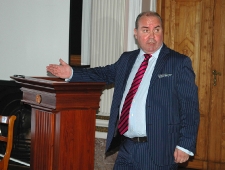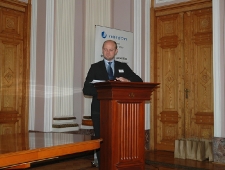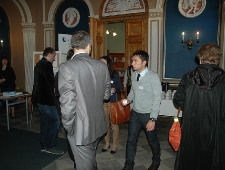Partner's satisfaction is very important
The Danish authority Workindenmark provides a public service designed for highly qualified international job-seekers and students looking to relocate to and work in Denmark after completing their studies. The portal acts as an information exchange point between employers and potential employees, providing advice on getting by in everyday life, assisting university students in finding work placement positions and offering programmes to help partners and children adapt to life in a new country.
Workindenmark director Marianne Hansen remarked at the seminar in Tallinn that a great deal of attention of late has been turned to ensuring the satisfaction of people's partners in Denmark, as surveys have shown that 80% of couples return to their own country earlier than planned if one of the partners is unhappy with where they are living.
In regard to finding the right person for the job, Finnish recruitment consultant Heikki Mäki said at the seminar that it is virtually impossible to find anyone who has 100% of the qualifications sought –¬ usually around 30% of the criteria have to be learnt in situ. He is of the view that Estonia is not sufficiently attractive or competitive in comparison with the Nordic countries, but could be a major destination for skilled labour from Russia.
Bringing talent home
Estonia is an example of a country where more people are leaving than are coming in, as a result of which the balance of migration has been in the red for many years. Studies have indicated that around 80% of people would be willing to return to the country if positions were available offering competitive salaries and there were attractive opportunities for self-development.
Siim Raie, the director of the Office of the President of the Republic, outlined at the seminar a project launched by the Estonian Chamber of Commerce and Industry in 2010 which brought together young people who had gone abroad to study or work with Estonian employers. The project, known as 'Bringing talent home', has since come to an end, and succeeded in enticing 27 youngsters back to Estonia. The team behind the project consider this a good result, and view it as a potential catalyst in encouraging the next wave of talented young Estonians to return to the country.
But in order to induce people to come back you need to make it as easy for them as possible. Advising them is very important: someone who has been away for a long time may no longer be au fait with day-to-day life in the country and therefore need a guiding hand. Bureaucracy can also be an issue if people return to Estonia with a foreign partner or children, which is why more substantial state support is needed when it comes to learning the national language and integrating into society.
Highly qualified labour from third countries
Like other Member States of the European Union, Estonia is looking for ways to make itself attractive to highly qualified workers so as to get them to both come here and stay here. There were around 160,000 third country nationals employed in the country in 2012, forming 14.7% of the working population, explained Eva-Maria Asari, a project manager from the Migration Studies Centre of the Estonian Academy of Security Sciences. She said that the main bottlenecks have been bureaucratic complexity and the lack of a support system. A number of changes were made to the Aliens Act in September 2013 which favour immigrants: support for the reunification of families, more rapid processing of paperwork and programmes of integration measures.
Migration policy in Estonia
In a debate among Riigikogu members at the seminar, Estonian MPs Kaja Kallas, Sven Mikser, Kadri Simson and Andres Herkel discussed what smart migration should entail. One of the target groups the state wishes to attract to the country is young students – and as such, education migration needs to be promoted.
The 'Smart migration policy' seminar was organised by the Estonian Office of the Nordic Council of Ministers and the University of Tartu in association with the Estonian Academy of Sciences and the Migration Studies Centre of the Estonian Academy of Security Sciences. It was attended by around 60 scientists, politicians and experts in the field.
The seminar was the continuation of a migration conference held in spring as part of a migration project launched by the Nordic Council of Ministers' Office in Estonia, which focussed on trends in emigration in the Baltic Sea region. The October seminar concentrated on the positions of experts and policy shapers, primarily on issues related to immigration.
This summary of the seminar was compiled by Kristi Sõmer from the University of Tartu.




